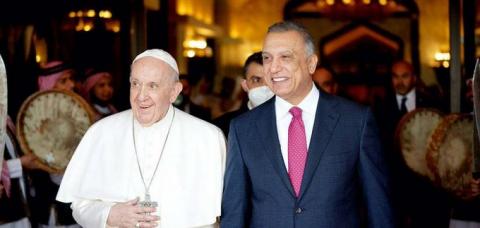
THE WINDS OF CHANGE BLOWING IN BAGHDAD
For years, Iraq’s future has been determined by its theocratic neighbour, the Islamic Republic of Iran. The Iranian regime’s vicious meddling in Iraq has caused growing resentment and resistance from the Iraqi people. There are now signs that the mullahs’ vicelike grip may be beginning to waver. But Iraq is not the only problem facing Tehran.
As the Biden administration sends yet another delegation to Vienna to continue negotiations on reviving the defunct JCPOA nuclear deal, Israel sits smugly on the sidelines, relishing the latest explosion at Iran’s Natanz underground nuclear facility. The mullahs have accused Israel of engineering the sabotage that caused extensive damage and a total blackout at the centrifuge plant, where the Iranians are boasting that they will enrich uranium to 60% purity, a hair’s breadth away from weapons grade. Although Israel has neither admitted nor denied its involvement in the Natanz explosion, no one doubts their determination to stop the theocratic regime from obtaining a nuclear weapon.
The Iranian economy has collapsed. There is massive unemployment and severe poverty. Due to the regime’s corruption and incompetence the death toll from the Coronavirus pandemic has soared to 250,000. Iran’s 80 million population are sick to death of their national wealth being stolen by the mullahs and pocketed, or squandered on their bid to build nuclear weapons and ballistic missiles and on proxy wars across the Middle East. That’s why Iran’s Supreme Leader Ayatollah Ali Khamenei is desperate for US sanctions to be lifted so that he can cling to power. His threat to install a further 1,000 centrifuges and accelerate his uranium enrichment programme is a blatant attempt to blackmail the West. President Biden should beware of falling into this trap. He should listen to the voice of the Iranian millions who demand regime change and he should listen to the people from neighbouring Iraq who echo those sentiments.
Iraqis are fed up with Iran. They once regarded Qasem Soleimani, the IRGC Quds Force commander, as a hero, for mobilizing the Iraqi militias and leading the fight to rid Iraq of the Islamic State’s jihadists. Under orders from Tehran, Soleimani led the ruthless Iranian-funded Popular Mobilization Forces (PMF) in a thinly disguised genocidal campaign aimed at eliminating Iraq’s Sunni population. In the process, he oversaw the almost complete destruction of the ancient cities of Fallujah, Ramadi and Mosul. Soleimani’s pretext of being the great liberator was in fact a lie. He was a murderer and terrorist and his elimination by the Americans in Baghdad Airport in January 2020 was entirely justified and came as a lethal blow to his Iranian masters. The elimination of Abu Mahdi Muhandis, the PMF commander killed in the same air strike, has left the Iranian-backed militias leaderless and in disarray. They have begun to splinter, as Iran’s stranglehold on Iraq loosens.
Iraq’s prime minister, Mustafa al-Kadhimi, is also refusing to kow-tow to Tehran. He does not belong to one of the pro-Iranian political factions and since taking office in May last year he has enforced American sanctions, preventing Iran from repatriating the billions of dollars it earns from exports to Iraq. This has infuriated the mullahs. Kadhimi has to walk a tightrope, trying to edge Iraq away from Iranian meddling, while attempting to placate ardently pro-Iranian members of his cabinet.
The situation is volatile. Iranian-backed militias have twice this year fired missiles at US personnel in Iraq and they have attacked Saudi targets with explosive drones launched from Iraq. Kadhimi has to try to stop the situation getting out of hand and his task may have become more difficult following the recent signing of a 25-year deal, allegedly worth $400 billion, between China and Iran, the terms of which virtually turn Iran into a Chinese colony. The accord brings Iran into China’s Belt and Road Initiative, a multi-trillion-dollar infrastructure scheme intended to stretch from East Asia to Europe. It is believed the deal will incorporate military cooperation between the two nations including weapon development and combined training and intelligence sharing. Strategically, this means that Kadhimi has to tread carefully when he opposes the mullahs, because in doing so he may risk irritating the Chinese.
The China-Iran deal also complicates American foreign policy. Where Joe Biden and his secretary of state Antony Blinken appear to be rushing towards restoring the JCPOA nuclear deal, the situation has now entirely changed. With China as its protector and provider, the terms of the JCPOA are obsolete. The promotion of Iran as a Chinese client state able to spread its influence and anti-Western capacity across the whole region, creates a fresh challenge for the US State Department. The Biden administration will have to design a new paradigm in dealing with Iran and the EU will have to re-think its grovelling appeasement policy to a nation which blatantly uses terrorism as statecraft, even sending its accredited diplomats to mount bomb outrages on European soil.
Kadhimi will also require a new strategy to counter the China-Iran threat. His ‘New Mashreq’ concept, which would cement an economic alliance with Jordan and Egypt, will be attractive to the Biden administration, although the mullahs clearly see such a powerful trilateral cooperation initiative as a threat to their hegemony in the region. The winds blowing out of Baghdad suggest that change is in the air. Giant posters and murals of Qasem Soleimani have been torn down from city walls. The Iran-backed militias are beginning to break apart. Mustafa al-Kadhimi seems to be asserting control and appears to be someone the West and Iraq’s allies can deal with. For 38 million Iraqis, who have experienced decades of war, insurgency, corruption and deprivation, the restoration of peace and economic stability is long overdue.



